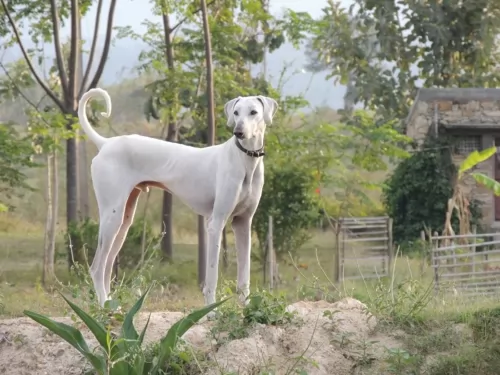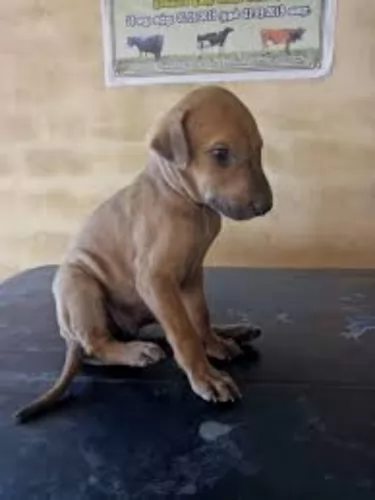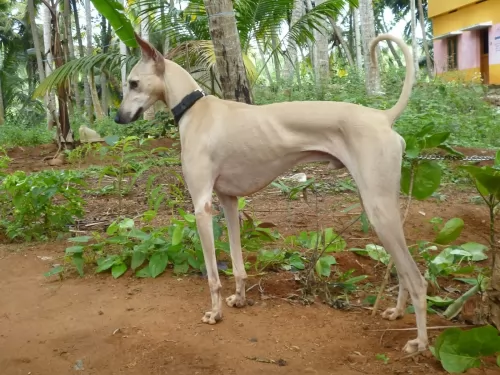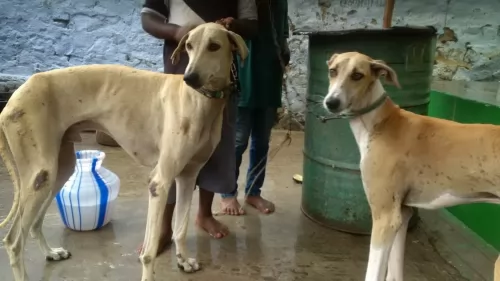 Petzlover
Petzlover Chippiparai is originated from India but Scottish Deerhound is originated from United Kingdom. Chippiparai may grow 18 cm / 7 inches shorter than Scottish Deerhound. Chippiparai may weigh 30 kg / 66 pounds lesser than Scottish Deerhound. Chippiparai may live 6 years more than Scottish Deerhound. Chippiparai may have less litter size than Scottish Deerhound. Both Chippiparai and Scottish Deerhound requires Low Maintenance.
Chippiparai is originated from India but Scottish Deerhound is originated from United Kingdom. Chippiparai may grow 18 cm / 7 inches shorter than Scottish Deerhound. Chippiparai may weigh 30 kg / 66 pounds lesser than Scottish Deerhound. Chippiparai may live 6 years more than Scottish Deerhound. Chippiparai may have less litter size than Scottish Deerhound. Both Chippiparai and Scottish Deerhound requires Low Maintenance.
 The Chippiparai is a working dog found in India and until recently there has been little interest in the purity of any breed, but rather only an emphasis on the abilities of the dog. They are only beginning to research the origin and history of their native dogs such as the Chippiparai. Not much is known about the origin of the breed except that it is found almost exclusively in Tamil Nadu and Keraia in the southern part of the subcontinent of India. Other than this there is much speculation about the breed’s origin but very little-known facts. It is indeed an ancient breed; however, its origin could be thousands of years ago or simply hundreds of years ago.
The Chippiparai is a working dog found in India and until recently there has been little interest in the purity of any breed, but rather only an emphasis on the abilities of the dog. They are only beginning to research the origin and history of their native dogs such as the Chippiparai. Not much is known about the origin of the breed except that it is found almost exclusively in Tamil Nadu and Keraia in the southern part of the subcontinent of India. Other than this there is much speculation about the breed’s origin but very little-known facts. It is indeed an ancient breed; however, its origin could be thousands of years ago or simply hundreds of years ago.
• Perhaps it is a descendant of the Saluki as it resembles this breed quite a bit. It has been believed for some time that the Saluki is the original sighthound and the source of all sighthound breeds. The Saluki was very popular in the Middle East, especially in Persia and Arabia from which it could easily have spread to India. It would then have been shared from Northern India to Southern India where the Chippiparai is found.
• Perhaps the Chippiparai is a descendent of sighthounds from Central Asia and Afghanistan – the Tazi, Taigan, Hortaya Borsaya or the Afghan Hound. This part of Central Asia had more trade, influence and contact with the Indian subcontinent early in their history than with any other region. The Chippiparai is considered by some to be more like these sighthounds than like the Saluki and the interaction between these regions has a much longer history than the Middle East and India.
• It is also speculated that the Chippiparai might have been developed completely and uniquely from the local street and working dogs. With the civilization of India being one of the oldest in the world, it is considered a possibility that the Chippiparai is the descendent of the Harappan hunting dogs that probably were developed by the Indus Valley or Harappa roiling class.
Wherever the Chippiparai came from, they were the exclusive property of the wealthy and ruling castes. These upper castes were the only ones that could legally hunt with dogs or afford to feed one. The royal classes of Tiruneivell, Thanjavur, and Madurai all fed the popularity of the breed among the upper castes. They were coursing dogs used to chase down the prey once it was sighted. The Chippiparai are incredibly fast runners and would catch almost any prey and either hold it or kill it for their hunter. The Chippiparai, when not hunting, had to be chained so they would not chase any small animal that they saw. This confinement also added to the purity of the breed as random breeding was prevented.
The southern part of the Indian subcontinent is extremely hot with routine temperatures over 100’. The Chippiparai was developed to withstand these extreme temperatures and is more heat tolerant than most any other breed. They also need very little food and are resistant to the many parasites and diseases found in southern India.
Harboring the belief that Indian dogs were not as good as European ones, the occupying countries of Portugal, France, and Britain, had no interest in the Chippiparai, again leaving the breed to develop naturally on their own with little or no interbreeding. They also received no formal recognition because Indian culture only valued the dog for its working abilities. There was no Indian Kennel Club until 1956.
The Chippiparai is now very rarely and only found in the area of its birth. Many believe the breed is in danger of becoming extinct and even though it is now registered with Indian Kennel Clubs it is not often shown in their dog shows. Lovers of the breed are now attempting to get Indians to recognize that the Chippiparai is a great companion animal and attempting to save the breed.
 The Scottish Deerhound is considered the Royal Dog of Scotland. It is a sighthound that is large and bred to hunt large Red Deer. They are similar in appearance to the Greyhound, but they are bigger and heavier. Closely related to the Irish Wolfhound, they were used in creating it. The Scottish Deerhound is an ancient breed that is now very rare. It can trace its lineage to the 16th and 17th centuries.
The Scottish Deerhound is considered the Royal Dog of Scotland. It is a sighthound that is large and bred to hunt large Red Deer. They are similar in appearance to the Greyhound, but they are bigger and heavier. Closely related to the Irish Wolfhound, they were used in creating it. The Scottish Deerhound is an ancient breed that is now very rare. It can trace its lineage to the 16th and 17th centuries.
The Deerhound was a favorite of hunting nobility and could not be kept by any person or household that did not have at least the rank of earl. Despite this history the Scottish Deerhound was not considered separate from the Highland Greyhound and other staghounds until the 19th century. They were bred to stalk or “course” the red deer and were used extensively for this purpose until the beginning of the 20th century. At that time there was a need for smaller, slower deer tracking dogs.
At the start of the 20th century, the land for deer hunting had grown smaller and so had the deer. Also, the invention of the rifle made the fast Deerhounds who could cover large tracks of ground in minutes, no longer a necessity for successful hunting. As the clan systems fell and the nobility rose, the Deerhounds became the dog for nobility and landowners. There were a few non-nobilities who also kept them and hunted with them. As they were less needed for hunting a few households kept them as show dogs.
In the United States and Canada, both the Scottish Deerhound and the Greyhound were used for hunting wolves and deer. In Australia, the Kangaroo Dog – a deerhound crossbreed, and Deerhounds were used to hunt wild boar, emu and kangaroos. The Deerhound is one of the oldest of the breeds that are Greyhound-like. The Deerhound is not as fast as the Greyhound if they are running on a smooth surface. Get them on a rough surface and the will out that Greyhound. They appear to be larger and rougher than they really are. This gives them an advantage over the lighter, smaller Greyhound.
The Deerhound was a contributor to development of the Irish Wolfhound toward the end of the 19th century.
 The Chippiparai is a typical sighthound although their size and appearance will vary more than that of registered purebred sighthounds. Typically, they will have a long, domed head with small erect ears and dark eyes. Their muzzle will be as deep and wide as the skull but longer. Their legs are straight and long, their chest is roached back and deep, giving them, an appearance very similar to a greyhound or other sighthound.
The Chippiparai is a typical sighthound although their size and appearance will vary more than that of registered purebred sighthounds. Typically, they will have a long, domed head with small erect ears and dark eyes. Their muzzle will be as deep and wide as the skull but longer. Their legs are straight and long, their chest is roached back and deep, giving them, an appearance very similar to a greyhound or other sighthound.
They have a long curly tail, and their coat can vary greatly in color. They are medium sized, and their coat is short, shiny and close. He is very slender and sleek, which along with his long legs gives him that incredible speed. They are thin with visible ribs.
 The Scottish Deerhound looks a lot like the Greyhound, except it is heavily boned and larger in size. The Deerhound is also different in several other ways. Instead of the Greyhound, the Scottish Deerhound is more closely related to the Irish Wolfhound than the Deerhound. The Deerhound is a large, rough coated breed. It is a very tall breed; in fact, it is the tallest of all sighthounds.
The Scottish Deerhound looks a lot like the Greyhound, except it is heavily boned and larger in size. The Deerhound is also different in several other ways. Instead of the Greyhound, the Scottish Deerhound is more closely related to the Irish Wolfhound than the Deerhound. The Deerhound is a large, rough coated breed. It is a very tall breed; in fact, it is the tallest of all sighthounds.
The Deerhound has a long head with a flat skull and a muzzle that tapers at the end. They have dark eyes and a scissor bite with a tail that can be either curved or straight. The hair on their tails almost touches the ground. The rest of its coat is wiry and harsh with a beard, mustache and mane. The ears are soft and can be either held semi erect or folded against their head. Their coat is gray or grey-blue today but in the past, it might have been brindle, red fawn or yellow.
 The Chippiparai is a loving, gentle family dog if well socialized, well trained and well exercised. They are very intelligent and need human companionship. Once they are living with a human family, they are very protective of that family. They are for the most part peaceful and quiet dogs. They are loyal and loving but they are not overly affectionate. Cuddlers they are not, and they do not like to play rough with children.
The Chippiparai is a loving, gentle family dog if well socialized, well trained and well exercised. They are very intelligent and need human companionship. Once they are living with a human family, they are very protective of that family. They are for the most part peaceful and quiet dogs. They are loyal and loving but they are not overly affectionate. Cuddlers they are not, and they do not like to play rough with children.
Accepting and loving within the family, the Chippiparai are equally hesitant and shy around strangers. They can be suspicious, but they are not aggressive. They are just very aloof with strangers, yet they hardly ever bark.
 There are no clinical studies regarding the health and health history of the Chippiparai, so little is known about their long-term health. However, most who know the breed, believe it is an incredibly healthy one. They seem to have a lot less genetically transmitted health issues than other purebreds. Because of their isolation for centuries in India, they have developed immunities and resistance to most parasites and diseases other dog suffer from.
There are no clinical studies regarding the health and health history of the Chippiparai, so little is known about their long-term health. However, most who know the breed, believe it is an incredibly healthy one. They seem to have a lot less genetically transmitted health issues than other purebreds. Because of their isolation for centuries in India, they have developed immunities and resistance to most parasites and diseases other dog suffer from.
Because of this you should look for the types of issues that occur in dogs of this size and build. Have them tested by the Canine Eye Registration Foundation and the Orthopedic Foundation for Animals.
 The Scottish Deerhound does face some serious challenges on the health front. These include:
The Scottish Deerhound does face some serious challenges on the health front. These include:
• Cystinuria – recessive disorder that causes an inability for cystine to be filtered from the urine.
• Gastric Dilatation Volvulus – otherwise known as bloat and it can be life threatening if not treated quickly.
 Do not overfeed your Chippiparai. Feed twice a day and no more than a total of 2.5 cups of high quality dry food.
Do not overfeed your Chippiparai. Feed twice a day and no more than a total of 2.5 cups of high quality dry food.
As mentioned previously the Chippiparai seems to have no genetic diseases or issues and very few acquired ones. However, he is sensitive to anesthesia and some foods. He is intolerant to cold weather and has a hard time with his pads on hard surfaces. Some Chippiparai might experience some of the ailments other breeds like them experience.
Both Elbow and hip are possible. This can cause arthritis and lameness. This occurs when the bone does not fit well into the joint.
This can cause lameness as well. The kneecaps slide over the knee instead of staying in place.
This is a hunting dog and he will want to hunt. They are incredibly fast and need the opportunity to run. Brisk walks will not be enough for this dog. He is very energetic. They will chase any small animals. It is not recommended that you have small pets even small dogs or cats with a Chippiparai. Having been bred for centuries to hunt, they are not likely to respond to any commands if they are off lease and chasing prey. Do not allow them to be off leash unless in a fenced area, and that fence needs to be 8 feet tall as they can easily jump a seven-foot fence. Try they at coursing, agility, fly ball and frisbee competitions.
 1.Feeding the puppy – Feed a high quality large or x large puppy dogfood at least 3-4 times a day. Do not overfeed.
1.Feeding the puppy – Feed a high quality large or x large puppy dogfood at least 3-4 times a day. Do not overfeed.
2.Feeding the adult – Feed a high-quality adult large or x large dog food once or twice a day. Do not overfeed.
4. Games and Exercises – The Deerhound needs plenty of exercise in a safe place where they have plenty of room to run. A small yard or life on a leash are not enough for this energetic breed. Play fetch, course running, Like the Greyhound they will be couch potatoes if you let them but that will hurt their health. Lure Coursing or hare coursing are good. Coyote hunting. Find space where they can run for the joy of running. Never force them to run – like along a bicycle